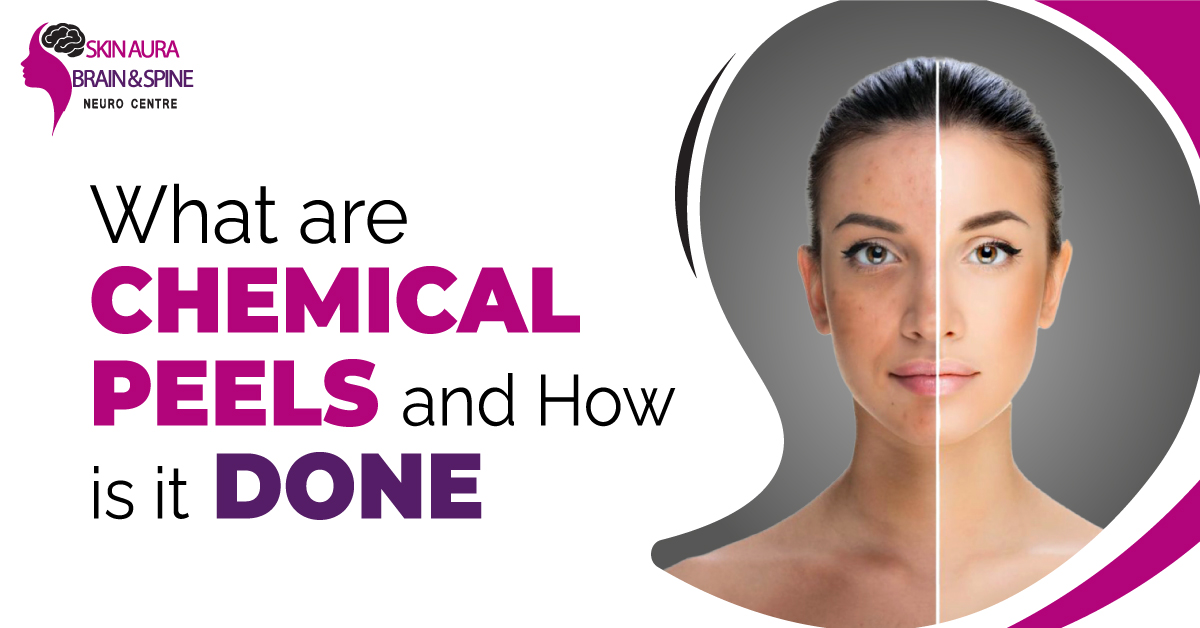Chemical peels remove the outer layers of skin to reveal the fresher, more vibrant skin beneath. Skin flaws like acne scars, wrinkles, and uneven skin tone can be enhanced with chemical peels. Different chemicals affect the depth of your peel and the sort of skin condition that will be treated.
Chemical peels – What are they?
Face, hands, and neck can benefit from chemical peels as aesthetic treatments. To enhance the look and feel of the skin, these products are applied to it. Exfoliation and subsequent skin shedding occur due to chemical solutions spraying on the treated region. The new skin is frequently smoother, less wrinkled, and more damaged when this happens.
For a variety of reasons, individuals may seek out chemical peels. Among the conditions they may be attempting to address: are wrinkles and fine lines.
Hyperpigmentation, scarring, and melasma are skin damage caused by the sun.
What are my options for chemical peels?
You have a choice of three distinct kinds of chemical peels treatment in Delhi NCR. Among them:
Superficial peels: A weak acid like alpha-hydroxy acid is used in superficial peels to exfoliate gently. There’s no way to get it past the epidermis.
Medium peels: Trichloroacetic or glycolic acid-based medium peels, which target the middle and outer layers of the skin, are also available. This enhances its ability to remove damaged skin cells.
Deep peels: Phenol or trichloroacetic acid are commonly used in deep peels, which go deep into the skin’s main layer to remove damaged skin cells.
What is the procedure for a chemical peel?
Outpatient surgical facilities may be used for thorough chemical peels, but this is rare. Your hair will most likely be tied back in preparation for the surgery. Eye protection, such as gauze or goggles, may be applied after washing your face.
If you’re getting a deep peel, your doctor may use a topical anesthetic to numb the region. Regional anesthesia is sometimes used for deep peels, as it can be administered across vast skin sections. They’re more likely to perform this if you’re getting work done on your face or neck. Your pulse rate will also be continuously monitored during deep peels, which require an IV.
Light peel
Chemical solutions like salicylic acid will be applied to the region being treated with gauze, a cotton ball, or a brush. The skin will get paler and may even tingle at first. Neutralizers or a chemical solution will be used once the process is complete.
Medium peel
A chemical solution is applied to your face with a cotton-tipped applicator, sponge, gauze, or three. Glycolic acid or Trichloroacetic acid may be present. To create a blue peel, trichloroacetic acid can be tinted blue. In a chemical peel clinic in India, your doctor will apply a cool compress to the skin as the skin begins to lighten. You may feel stinging or burning for up to 20 minutes after the procedure. No neutralizer is required; however, you may be given a hand-held fan to help you cool down. After having the blue peel, you may have a blue hue to your skin for a few days.
Deep peel
A deep chemical peel will require sedation or general anesthesia. It will be applied to your skin using a cotton-tipped applicator. As a result, you’ll have a pale, almost white skin tone. The process will be completed in 15-minute increments to minimize the amount of time the acid is in contact with the skin.
Is there anything you need to do before a chemical peel to prepare?
Before the operation, you’ll meet with the chemical peel doctors in India for a consultation. When you visit Skin Aura Brain and Spine Neuro Center, they’ll assist you in selecting the best treatment option for you. Your peel will be explained to you, and they’ll inquire about anything that can jeopardize the procedure. Acne medications and information about your tendency to scar readily can be included.
Retinol and Retin-A topical drugs should not be used for at least 48 hours before the chemical peel; any other medications should be disclosed to your skin care specialist, and Accutane should not have been taken for at least six months before the chemical peel.
Take an antiviral medication if you have a history of fever blisters or cold sores to prevent a breakout around the mouth; use special lotions like glycolic acid lotion; apply a retinoid cream to avoid skin darkening; and stop epilating, waxing, or using depilatory hair removal products a week before the peel. Hair bleaching should also be avoided.
One week before the peel, refrain from using any face scrubs or exfoliants.
Arrange for transportation home, especially if you’ll be sedated for medium or deep chemical peels throughout the procedure.
Taking a painkiller or sedative prescribed by your doctor is essential; you may have to do so before arriving at the appointment.
Follow your doctor’s post-surgery instructions to the letter. They’ll tell you how and how often to wash and moisturize your face and what products to use. Don’t use makeup or other cosmetics until you’ve had a chance to see a doctor and are cleared. A cool fan or ice packs can be used for 20 minutes each to alleviate discomfort in the comfort of your home.
